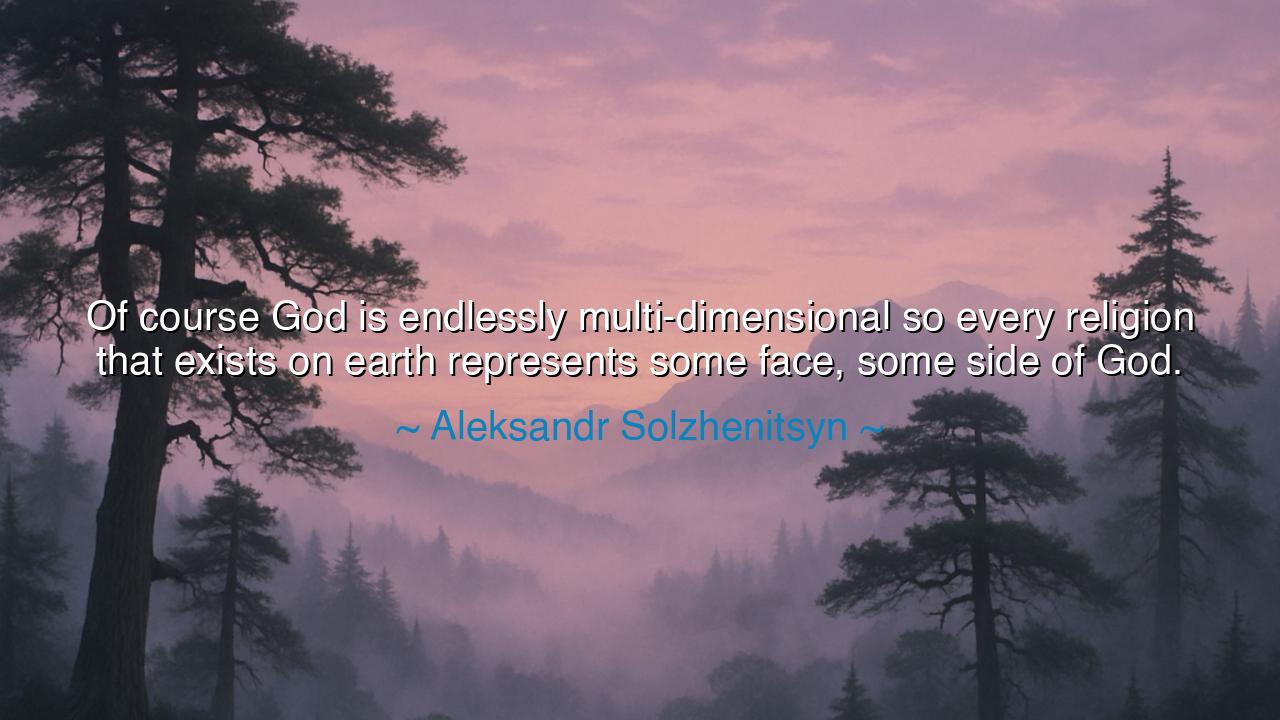
Of course God is endlessly multi-dimensional so every religion
Of course God is endlessly multi-dimensional so every religion that exists on earth represents some face, some side of God.






“Of course God is endlessly multi-dimensional, so every religion that exists on earth represents some face, some side of God.” Thus spoke Aleksandr Solzhenitsyn, the prophet of conscience, the exile who turned suffering into revelation. His words flow not from the halls of theology but from the crucible of human experience—from the darkness of the Soviet gulags, where men forgot hope and yet still found the divine. In this saying, he offers a vision vast as the heavens: that the divine is infinite, beyond all names, forms, and creeds. Each faith, each tradition, each whisper of prayer is but a fragment—a ray of light refracted through the prism of eternity. No single religion holds all of God; each bears only a facet of the eternal mystery.
To understand this truth, we must understand the man who spoke it. Aleksandr Solzhenitsyn, a Russian writer and dissident, endured years in the labor camps of Stalin’s regime. There, in the bleakest of places, where cruelty reigned and faith was forbidden, he discovered the sacred presence that no tyranny could silence. In the silence of snow and the ache of hunger, he felt the vastness of God—not the God of institutions or ideology, but the God of infinite depth, who revealed Himself in compassion, endurance, and truth. Having seen men of all faiths and none suffer side by side, Solzhenitsyn came to believe that divinity could not be confined to one nation, one church, or one name. Thus, his words were born not from doctrine but from revelation: that the soul of God is manifold, and that every religion, in its striving, touches a piece of the divine whole.
In saying that God is “multi-dimensional,” Solzhenitsyn reminds us of our own limitation. The human mind, bound by time and language, seeks to understand the infinite by carving it into shape. So it is that religions arise—each a window through which men and women glimpse the divine, each reflecting its own light and color. The Christians see God in love and sacrifice; the Muslims in submission and justice; the Hindus in creation’s unity; the Buddhists in compassion and awakening. None are wrong, for each holds truth. But none are complete, for the totality of God surpasses comprehension. As the blind men in the ancient Indian parable each touch a part of the elephant and mistake it for the whole, so too do we grasp only fragments of the infinite, calling our fragment “truth.” Solzhenitsyn’s wisdom is the humility to know that even truth must bow before the mystery of God.
Consider the story of Mahatma Gandhi, a Hindu who carried within his heart the teachings of Christ and the compassion of the Buddha. Gandhi once said, “Religions are different roads converging toward the same point. What does it matter if we take different roads, so long as we reach the same goal?” In him, Solzhenitsyn’s vision takes flesh. Gandhi saw in every faith a reflection of the same divine essence—a unity hidden beneath the diversity of forms. He prayed with Hindus, Christians, Muslims, and Jews alike, finding in their prayers not division, but harmony. His life stands as a living testimony to Solzhenitsyn’s teaching: that when we honor another’s path to God, we honor God Himself.
Solzhenitsyn’s insight also carries a warning. When religion forgets its humility—when it claims to possess the entirety of divine truth—it becomes idolatry. It worships its own image of God rather than the living reality that transcends it. The wars of history, the persecutions and inquisitions, all arose from this blindness—the belief that one vision could contain the infinite. Solzhenitsyn, who saw the violence of atheistic tyranny in his homeland, understood too well the danger of dogma without humility. Whether it comes in the name of religion or ideology, it is the same evil: the attempt to bind the infinite to a single word. True faith, he teaches, does not imprison God—it listens, it learns, it bows before the vastness that cannot be owned.
This truth, my child of the seeking heart, is both liberating and humbling. It calls us not to abandon our faith, but to deepen it through understanding. To see that your religion is a facet of God is not to weaken it, but to strengthen it through compassion. You need not cease being Christian, Muslim, or Jew; rather, become so deeply rooted in your faith that you see its echo in the faith of others. Let love, not pride, be the measure of your belief. For if every religion reveals a face of God, then every act of kindness reveals His heart. When you encounter difference, do not fear it—greet it as another reflection of the divine you already serve.
So remember, O seeker of truth: God is endless, and the human soul is but a mirror. Each of us reflects a sliver of His light; together, we form the radiance of the whole. When you hear the prayer of another, do not close your ears, for it may be the very voice of the divine you long to hear. When you see the temple, the mosque, the church, or the shrine, bow your head in reverence, for God walks through them all. For this is the lesson of Solzhenitsyn’s wisdom: that the sacred wears many faces, and the path to heaven is wide enough for every pilgrim who walks in sincerity.
In the end, let these words be your compass: seek not to own God, but to know Him; seek not to judge the forms of faith, but to find their light. For every religion is a reflection, and every reflection a reminder—that the divine is not small enough to belong to any one of us, but great enough to embrace us all.






AAdministratorAdministrator
Welcome, honored guests. Please leave a comment, we will respond soon